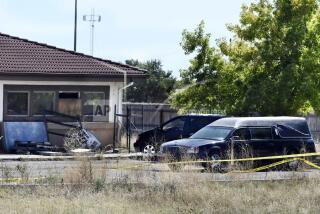Arlington National Cemetery’s top supervisors ousted in mismanagement case
- Share via
Reporting from Washington — The Army ousted top supervisors of Arlington National Cemetery in the wake of a blistering report that found some graves had been mismarked and that raised questions about the Virginia burial ground’s management, officials announced Thursday.
Army Secretary John McHugh said the Army inspector general’s report raised questions about 211 gravesites and found unmarked graves, burial sites with the wrong headstones and improper handling of cremated remains.
“That all ends today,” McHugh said.
The inspector general, Lt. Gen. R. Steven Whitcomb, found one case involving personnel killed in Iraq or Afghanistan. In that instance, two grave markers had been switched. Other cases involved areas of the cemetery used to inter personnel from earlier conflicts.
There are 330,000 bodies buried at Arlington, including Presidents Kennedy and Taft. As many as 30 funerals are held there each day, some for veterans of past wars and others for military personnel killed in Afghanistan or Iraq.
The extent of the problems at one of the nation’s most venerated memorials was not entirely clear. In some cases, grave markers had been knocked over and not properly replaced, the report said. Other reported cases involved poor record-keeping. Whitcomb said there was no indication of mistakes at the point of burial.
But in one incident described in the report, a cremation urn with the remains of an Air Force master sergeant, who served in Vietnam and died in 2007, was buried above the casket of an Army staff sergeant.
The report also found that some cremation urns were mistakenly disinterred and moved to an area of the cemetery where excess dirt was held. One such set of remains had to be reburied as “unknown” because the urn was unmarked, the report said.
Explaining how gravesites could be disturbed, Whitcomb said cremated remains often had been removed to accommodate the burial of another family member at the same site, a permitted practice. But in some cases, the urns appeared to be improperly handled by cemetery workers or officials.
The problems at Arlington were raised in a series of reports by the online magazine Salon and in other publications. Those reports, as well as relatives’ complaints and employees’ concerns, prompted the inspector general’s investigation, which began in August.
Respect for the country’s war dead is a top military priority.
“Of all the things in the world, we view this as a zero-defect operation,” Whitcomb said.
On Thursday, McHugh appointed Kathryn Condon, a senior Army civilian official, as executive director of the Army National Cemeteries program, a new position.
McHugh also announced the formation of the Army National Cemeteries Advisory Commission to advise on the oversight of the burial ground. Two former U.S. senators — Bob Dole, a World War II veteran, and Max Cleland, a Vietnam War veteran — will help form the commission, McHugh said.
“The intent of the steps I have ordered today are designed to make sure things are done absolutely correctly from this day forward,” McHugh said.
Cemetery Supt. John Metzler had announced last month that he intended to retire July 2. His exit, officials said, was the result of pressure from Army officials.
McHugh made public a brutal letter of reprimand filed against Metzler this week. In it, McHugh held Metzler responsible for the cemetery’s problems and for systemic shortcomings that continued for years.
Metzler’s deputy, Thurman Higgenbotham, also was stripped of responsibility. Investigations of his actions are continuing, officials said.
Paul Rieckhoff, founder of Iraq and Afghanistan Veterans of America, said members of his organization were “concerned and outraged” by the inspector general’s findings.
“It is absolutely unacceptable that something like this would happen at America’s most sacred burial ground,” Rieckhoff said. “We expect swift action from the Pentagon and the administration.”
The White House weighed in too.
“We have no more solemn commitment than to respect the service and the memory of those that died in service to preserving our freedom as a country,” Press Secretary Robert Gibbs said.
More to Read
Sign up for Essential California
The most important California stories and recommendations in your inbox every morning.
You may occasionally receive promotional content from the Los Angeles Times.












